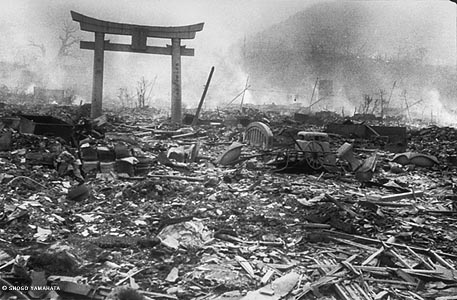Three days ago, I wrote a piece titled, “Moral Rationalizing 69 Years Later: The Atomic Bombing of Hiroshima,” which you can find here.
Well, on this day, 69 years ago, we followed up dropping an atomic bomb on Hiroshima with dropping an atomic bomb on Nagasaki. And killing 74,000 people in the a split second.
Civilians, mind you.
From the Nagasaki Atomic Bomb Museum:
It was over this section of Nagasaki that the second atomic bomb exploded at 11:02 a.m., August 9, 1945. The damages inflicted on Nagasaki by the atomic bombing defy description. The 20 machi or neighborhoods within a one kilometer radius of the atomic bombing were completely destroyed by the heat flash and blast wind generated by the explosion and then reduced to ashes by the subsequent fires. About 80% of houses in the more than 20 neighborhoods between one and two kilometers from the hypocenter collapsed and burned, and when the smoke cleared the entire area was strewn with corpses. This area within two kilometers of the hypocenter is referred to as the hypocenter zone.
The destruction caused by the atomic bomb is analyzed as follows in Nagasaki Shisei Rokujugonenshi Kohen [History of Nagasaki City on the 65th Anniversary of Municipal Incorporation, Volume 2] published in 1959. The area within one kilometer of the hypocenter: Almost all humans and animals died instantly as a result of the explosive force and heat generated by the explosion. Wooden structures, houses and other buildings were pulverized. In the hypocenter area the debris was immediately reduced to ashes, while in other areas raging fires broke out almost simultaneously. Gravestones toppled and broke. Plants and trees of all sizes were snapped off at the stems and left to burn facing away from the hypocenter.
Killed in an instant. It’s beyond tragic.
General LeMay in charge of sending the bombers which dropped the atomic bomb on the two cities, when asked about his bombing campaigns, stated There are no innocent civilians, so it doesn’t bother me so much to be killing innocent bystanders.
(He also mused, later, I suppose if I had lost the war, I would have been tried as a war criminal.
) The interim committee deciding to drop the bomb stated, on May 31, 1945, that we could not give the Japanese any warning
before the atomic bombing of Hiroshima. Of course, no specific warning was given to the civilians of Nagasaki, either, at any point, all of this according to Rad Geek’s People Daily here.
We acted as war criminals or in the modern parlance, terrorists.
And as that above site finishes:
None of these vicious acts by a vicious government justifies doing this to Japanese people, to civilian men, women and children who had no meaningful role in either the decision-making or in the fighting. No crime or atrocity of the Japanese government excuses a half-year campaign of terror against Japanese cities; no political goal allows the U.S. government to seek victory by burning 1,000,000 civilians alive. No strategic necessity justifies turning such weapons on a city of 240,000 men, women and children; no need or desire of war justifies treating 74,000 souls like this. Nothing ever could.
Yet, we do still justify it somehow. It’s beyond comprehension to me.




WE, THE BRITISH AND AMERICANS, DID NOT START THE WAR. THE JAPS WOULD NEVER HAD SURRENDERED – NEVER – THEY HATED (HATE?) WE WESTERNERS AND THE ATROCITIES WHICH THEY DEALT OUT TO THE CHINESE (NANKING) AND OUR MEN, WOMEN AND CHILDREN WHO WERE TAKEN AS PRISONERS OF WAR, WAS ABOMINABLE. THE BOMBS WERE THE ONLY WAY WE COULD STOP THEM – PROBLEM IS, WE DID NOT DROP ENOUGH, WE SHOULD HAVE WIPED THE JAP RACE OFF THE FACE OF THE EARTH.
LikeLike
William, I consider that a repugnant view. The Japanese did terrible things, as you cited. However, committing a genocide against an entire group of people, in response, isn’t the correct response, either.
LikeLike